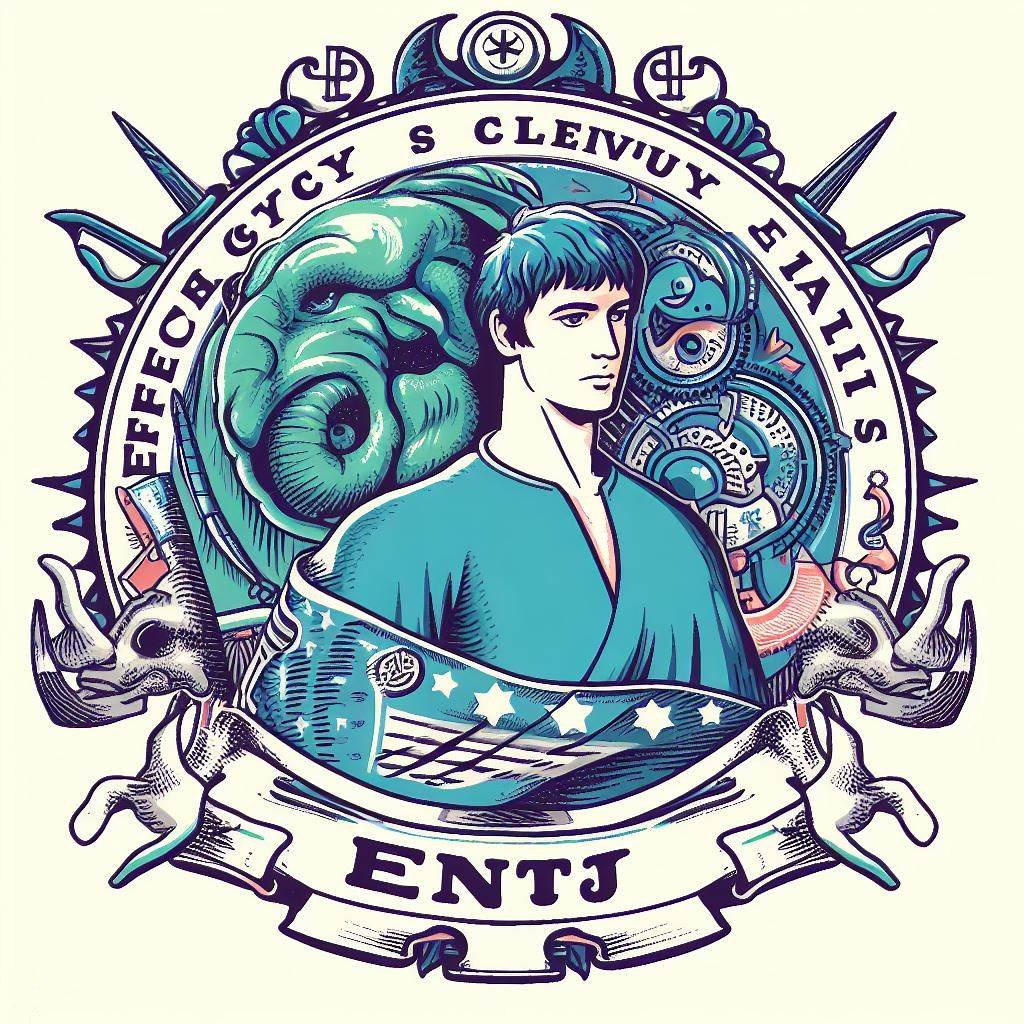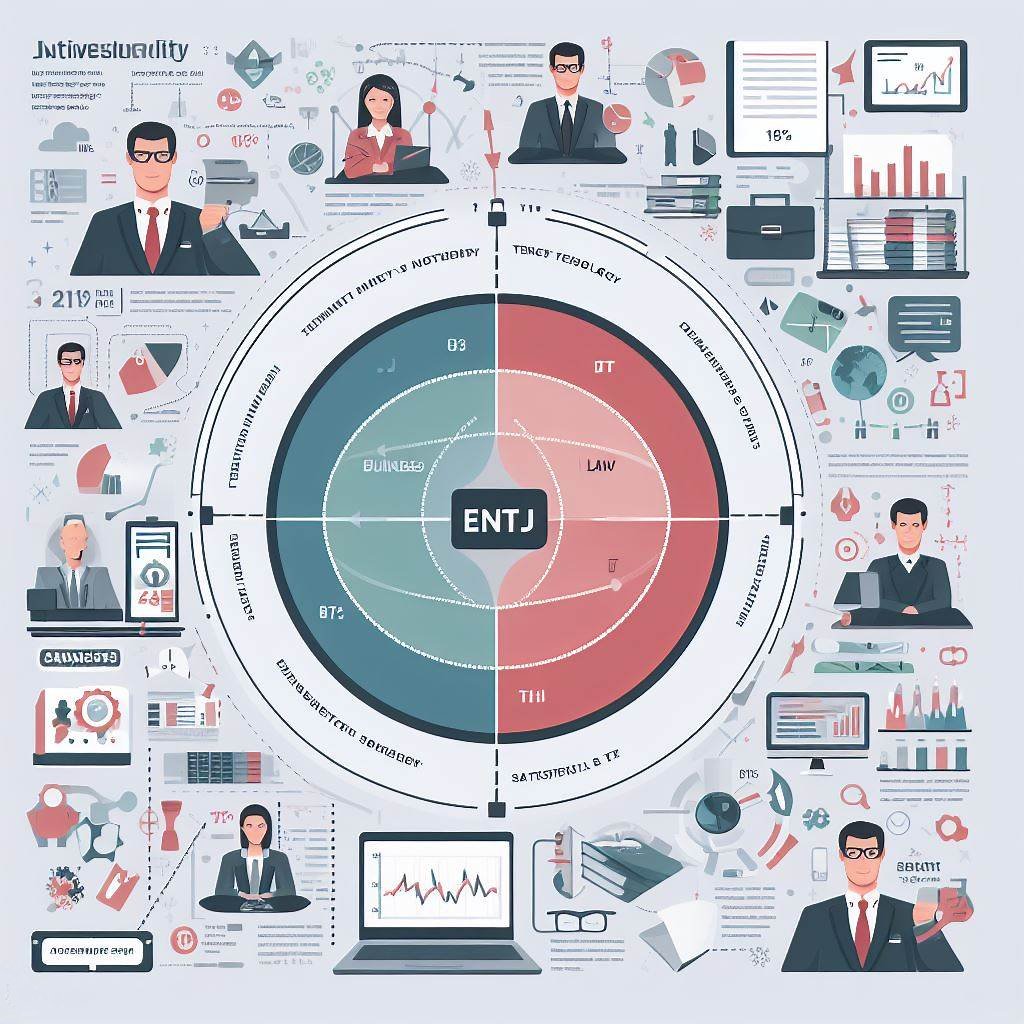
Assertive, analytical and objective - these traits characterize those with the ENTJ personality type. Representing around 3% of the population, ENTJs are motivated leaders focused on organizing human resources efficiently to achieve complex goals. ENTJs approach life with confidence and value competence, knowledge and rational decision making.

As extroverted thinking types, ENTJs lead outwardly with objective logic and strategy. They quickly identify inefficiencies and come up with plans for improvement, which they convey directly. ENTJs like implementing complex systems to accomplish tangible results. They think conceptually about the big picture but value pragmatism.
ENTJs also utilize introverted intuition (Ni). This allows them to easily recognize patterns and interconnections. They synthesize insights and forecasts to create innovative long-term plans. Tertiary extroverted sensing (Se) gives ENTJs a realistic, results-focused perspective. Their inferior function is introverted feeling (Fi), making them less naturally in tune with forming ethical conclusions based on internal values.
Overall, ENTJs are focused, decisive leaders who think strategically and drive results. They thrive when implementing structured plans that maximize efficiency and accomplish measurable goals. ENTJs desire knowledge and achievement.
ENTJs display many trademark characteristics due to their dominant extroverted thinking function. They tend to be:
Driven, focused and result-oriented - ENTJs maintain constant forward momentum. They hate inefficiency and waste.
Analytical and objective - ENTJs make decisions using impersonal logic, dismissing irrational sentiment. They critique ideas rationally.
Skeptical and questioning - ENTJs play devil's advocate to test concepts thoroughly before accepting them. They avoid assumptions.
Argumentative - ENTJs enjoy lively intellectual debates and playing with logic and rhetoric.
Strategic, conceptual planners - Combining intuition with logic allows ENTJs to design effective systems and forecast future needs.
Direct and straightforward communicators - ENTJs are clear, focused and concise. They avoid emotional displays or sugarcoating.
Confident, assertive leaders - ENTJs take charge and direct groups decisively towards goals. They expect competence.
Knowledge-seeking - ENTJs have active, curious minds eager to learn concepts that can improve efficiency.
Driven to achieve - ENTJs set ambitious objectives and relentlessly pursue measurable high performance and success.
Intolerant of inefficiency - ENTJs become easily irritated by disorganization, indecision and misguided priorities.
As leaders and partners, ENTJs are motivated to construct efficient systems that accomplish tangible objectives. They enjoy developing strategies and solving complex problems rationally and creatively. ENTJs thrive when knowledge, competence and logical analysis are valued.
With their potent combination of intellectual confidence, objective analysis and drive, ENTJs offer many strengths:
ENTJs approach projects strategically with both big picture vision and eye for detail. This allows them to create effective complex solutions.
ENTJs get right to the point. They clearly explain rational conclusions so that everyone grasps key concepts and priorities.
ENTJs readily understand complex systems by using objective analysis to identify flaws and test improvements. They optimize efficiency.
Never satisfied with the status quo, ENTJs imagine how things could be improved and then work to make those visions a reality through sheer determination.
ENTJs lead decisively, giving direction with self-assurance. They inspire groups by setting ambitious targets and holding members accountable.
With their knack for strategy and logistics, ENTJs can effectively coordinate complex operations with many moving parts to get results.
ENTJs overcome challenges by first gathering data, generating potential solutions through objective analysis, then directly implementing the most rational plan.
ENTJs thrive when continuously acquiring new knowledge that might improve efficiency. Their intellectual curiosity fuels self-improvement.
With their talent for conceptual analysis, strategy and execution, ENTJs contribute greatly to organizations that value competent leadership and measurable results.
For all their capabilities, ENTJs have some natural weaknesses:
The ENTJ's directness may inadvertently hurt feelings or provoke emotional reactions when diplomacy would have been wiser. Their delivery lacks tact.
ENTJs enjoy argument and criticism. While lively debate sharpens ideas, their challenging approach may seem abrasive or arrogant, especially to feeling types.
Eager for rapid progress, ENTJs get quickly irritated by obstacles like unnecessary meetings, repetitions or inefficient processes that hinder momentum. Their impatience can be perceived as intolerance.
ENTJs dismiss emotional arguments and make decisions rationally. However, avoiding discussions of feelings may strain personal relationships with feeling-oriented types.
ENTJs often see logical gaps in others' positions and point them out directly. However, this may come across as dismissing opinions that differ from their own. They can seem stubborn.
With their penchant for control, ENTJs may take over projects that would benefit from more collaborative approaches. Dictatorial behavior stifles team unity.
The ENTJ's direct, truthful communication style may neglect audience sensitivity. Their candidness may cause unnecessary hurt feelings in some contexts. More diplomacy would help.
To improve effectiveness, ENTJs should reflect on when to restrain their more abrasive tendencies and practice flexing their lesser-developed skills. Patience and consideration complement their strengths.
ENTJs make dedicated partners and leaders who motivate others to achieve shared goals. Still, some personality types naturally understand the ENTJ better than others.
ENFP ENFPs appreciate and return the ENTJ's intellectual stimulation. Shared extroversion.
INTJ ENTJs and INTJs connect over strategic thinking, competence and achievement. Shared intuition.
ESTJ Both value objective logic in decision-making. Extroverted thinking types.
ENTP Shared extroversion, thinking preference and intellectual energy. Sparring partners.
ISFJ ENTJs can seem blunt and impatient to ISFJs, who prefer tactful communication. Intuition vs. sensing.
INFP
INFPs seek harmony, while ENTJs enjoy debate. Feeling vs. thinking approaches.
ESFP ESFPs dislike the ENTJ's rigid planning, preferring spontaneity. Judging vs. perceiving.
ISTP
ISTPs are less driven than ENTJs. Introverted vs. extroverted thinkers.
Of course any partnership involves compromise, but dominant thinkers like ENTJs often clash most frequently with strong feeling types, who can perceive them as callous or controlling. Developing tact and recognizing emotions facilitates relationships.
ENTJs thrive in careers where they can analyze complex strategies, lead teams toward measurable objectives, and amass knowledge to generate solutions. Suitable careers include:

Management Consultant - Strategic planning and diagnosing organizational issues play to ENTJ strengths.
Financial Manager - ENTJs utilize analytical skills optimizing investment portfolios and securing profitable returns.
Engineer - This field allows ENTJs to apply scientific knowledge to construct efficient systems and solve concrete problems.
Attorney - Arguing cases and critiquing legal complexities satisfies the ENTJ mindset.
Project Manager - Overseeing complex projects involving strategy, systems design and coordinated teams is a perfect fit.
Technology Executive - ENTJs excel directing organizations by making rational decisions and driving measurable growth.
Investment Banker - ENTJs thrive in this fast-paced environment analyzing deals and strategizing transactions.
Marketer - Developing conceptual campaigns and directing sales teams matches the ENTJ approach.
Entrepreneur - ENTJs prosper building their own innovative ventures and leading expansion.
Ideal careers provide autonomy and challenge while utilizing ENTJs' gifts for strategic analysis, decisive command and knowledge accumulation. They thrive when allowed to optimize processes and accomplish tangible goals.
To enhance their strengths, ENTJs should:
ENTJs should think before speaking to determine if their message could be conveyed more tactfully. Seek feedback from trusted advisors.
Rather than immediately critiquing, ENTJs should inquire about the reasons and values underlying others' positions. This builds understanding.
ENTJs focus outwardly and may neglect inner growth. Schedule regular time for self-reflection through journaling, meditation or open-ended vacation days.
Make an effort to discuss emotions more with trusted loved ones. Recognize that values and feelings are valid considerations too.
ENTJs should empower team members by relinquishing some control. This builds competence in others and frees up the ENTJ's energy.
Rather than planning replies while others speak, ENTJs should focus completely on comprehending different viewpoints. This shows respect.
Withholding knee-jerk judgement allows ENTJs to gather more information. They should avoid pigeonholing ideas too quickly. Remain open.
Adjusting their more insensitive tendencies helps ENTJs work cooperatively with others and become more holistic leaders. Rational analysis excels when complemented by empathy and flexibility.
As natural leaders motivated by achievement, many prominent historical figures have displayed ENTJ tendencies:
Franklin D. Roosevelt
This influential U.S. president crafted ambitious, wide-ranging policies to lift America from the Great Depression. A commanding strategist.
Margaret Thatcher
The formidable British prime minister restructured the economy and led confidently. She was nicknamed "The Iron Lady."
Winston Churchill
The prime minister's military strategies and rousing speeches rallied Britain during WWII. A visionary leader.
General George Patton
The daring general led troops during WWII, implementing creative maneuvers and refusing to back down from a fight.
Malcolm X
As a civil rights activist, Malcolm X used objective analysis and stirring speeches to promote change and advocate for justice.
Elon Musk
The Tesla CEO dreams big and takes decisive action. His bold vision for improved technology and space travel inspires progress.
Prominent ENTJs throughout history have led strategically and initiated bold visions. ENTJs make their mark through rational competence, confidence and a results-driven approach. They inspire achievement in others.
With their analytical intelligence, verbal skills and fearless vision, ENTJs are natural leaders in pursuit of efficiency and progress. They approach life strategically and value structured planning, competence and objective reasoning. While their insensitive delivery can cause interpersonal conflict, ENTJs excel when allowed to optimize systems and processes. They are dynamic leaders whose innovative strategies and hard-nosed rationality generate measurable achievements. By developing their diplomatic skills, ENTJs can become inspiring commanders capable of motivating teams to incredible accomplishments.